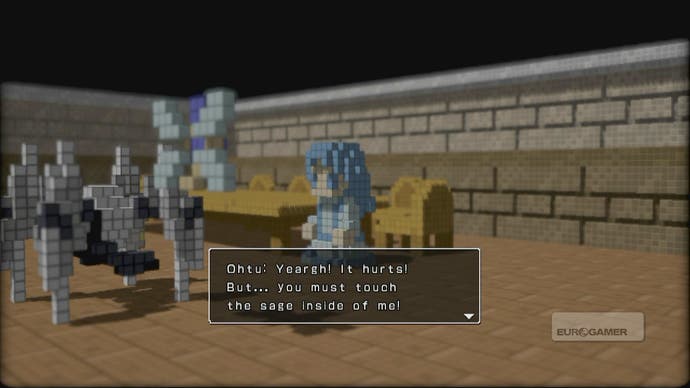3D Dot Game Heroes
Lust in translation?
Let's be clear upfront: 3D Dot Game Heroes is never less than delightful, and frequently more than merely charming. It's really good fun to play. Rush through it in a headlong blur of exploration, simple combat, dungeon-crawling and item management, and you'll probably be left with a sleepy grin on your face, as if you've pummelled your insides with peanut butter and marshmallow crème for a fortnight while listening to a Neil Diamond mixtape.
Slow down and think about what you're doing, however, and things become a little more problematic. I like this game, from the several hours of it I've played and all the other things I've subsequently read on the web, but there's no getting around the fact that it crosses a line few other titles have ventured past.
It all comes down to inspirations, really. Or maybe that should be borrowing, or theft, or homage if you've been watching a lot of black and white films recently. Almost all games pinch things, of course. We tend to judge them by how well they embellish those lifts: what they bring of their own, and how they make things new again - or if it looks like they're just scrabbling to cover their tracks.
3D Dot Game Heroes is a bit trickier to get your head round, however. It sells itself on the things it's taken, and it wouldn't dream of hiding what it's been up to. It's robbed the bank, then, but it's not trying to make a getaway. What's it really doing?

Maybe it's happy to trot along as a game about games - or rather, a game about one very specific series. Silicon Studio is so open with its raiding of the Legend of Zelda - it's taken a world, a structure, specific animations and, a few notes aside, entire melodies - that it can be hard to know how to respond. It's certainly not trying to pass Nintendo's ideas off as its own: perhaps it just loves the same games you do - the 8- and 16-bit Zeldas in particular - and it's found a way to bring everyone a bit more of them.
And that way is, as the name suggests, three dimensions. It's a shift the game has a lot of innocent fun with. Single pixels become plastic cubes that shatter under the blow of a sword, chunky castles spring out of the flat ground in the adorable opening crawl, and townsfolk complain that their houses are so much more difficult to clean now that they have a z axis, or a y axis… or whatever stupid axis it is. Help.
Despite the unusual perspective on an 8-bit world, however, this faux-voxel delight never shies away from the familiar. In fact, it dunks you into it every five seconds or so, dropping you outside a castle where your first mission is to go leave a magical sword in the woods for a future age when heroes will need it, and then sending you back out again, almost immediately, to pluck it up once more when darkness falls across the land.








